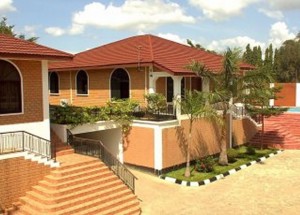Ghana government urged to facilitate establishment of assembling plants for housing sector
 Players in the building and construction sector have called on the Government to facilitate the establishment of assembling plants for the production of materials needed in the housing industry.
Players in the building and construction sector have called on the Government to facilitate the establishment of assembling plants for the production of materials needed in the housing industry.
They said such a move, as being done in the automobile sector, would help reduce the cost of materials and consequently, the cost of housing in the country.
Mr Ebenezer Kwadwo Saka Addo-Mensah, Managing Director of Saka Homes, a Real Estate and Land Development firm made this recommendation to the government.
He was speaking to the Ghana News Agency in an interview on the sidelines of a breakfast meeting with industry playrs in Accra on Thursday.
The Sustainable Development Goal (SDG) investor map meeting was on the theme: “Identifying opportunities and enhancing local participation in housing and infrastructure sectors.”
It was organised by Ghana Investment Promotion Centre (GIPC) in collaboration with the United Nations Development Programme (UNDP).
Mr Addo-Mensah said that creating an enabling environment for companies with the capacity to establish plants in the country would: “Go a long way to help with the cost.”
He explained that: “For instance, the cost of tiles being produced at Takoradi at the moment is way lower than the tiles that we import, and that’s where my company buys from.”
The Real Estate Developer added that: “We can replicate same with other building materials like ceramics, louvers and ceilings.”
” When we produce these locally, it also create jobs for us. So it is something that we should consciously look at.”
He noted that there were opportunities for the Government to reduce the housing gap of about 85,000 housing units yearly, and the overall two million housing unit needs before the COVID-19 pandemic.
Mr Addo-Mensah said: “GIPC is in the position to attract such investments into Ghana. The government just has to provide incentives that will make these companies come here, including tax waivers, maybe free lands.”
Ghana requires a total of $9.3 billion, annually, to bridge its infrastructure gap, 20 per cent of such amount ($1.86 billion) is required in the housing sector.
Mr Yofi Grant, Chief Executive Officer of GIPC, said that such financing gap required significant investment in the housing and infrastructure sector.
He indicated that the Centre was facilitating investment into the housing sector by speaking with private sector players and partnering with UNDP through the investor map, to outline critical areas that they could contribute for economic growth.
He said that the government was using the One District-One Factory (1D1F) initiative to entice private companies, including indigenous ones, to produce some of the materials needed in the housing sector.
Mr Grant noted that: “The government was providing locational incentives, duty free on plant, equipment and machinery to manufacture for local consumption and export.”
About 60 per cent of the working population in Ghana needs help to access housing and about 35 per cent not able to access housing even with government support through subsidies.
That, Mr Sukhrob Khoshmukhamedov, UNDP Deputy Resident Representative, said presented opportunities for the private sector to partner with the government in its quest to close the infrastructure gap.
He noted that numerous studies, including ones conducted by UNDP had proven that infrastructure growth and services could play a critical role in economic growth and poverty reduction.
He added that: “It also enhances human security, particularly of poor people, by contributing to their security in food, employment, health, communities, personal and environmental security.”
Source: GNA
